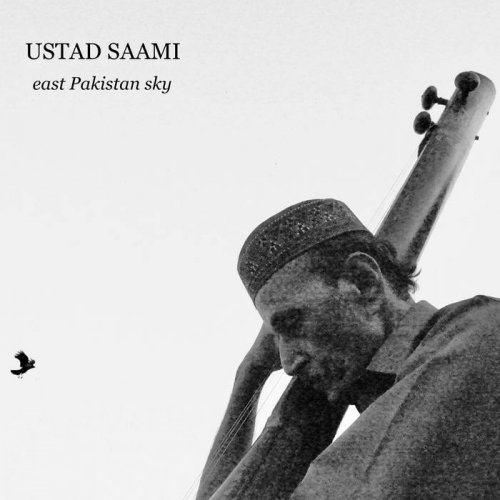Ustad Saami - East Pakistan Sky (2021)

Artist: Ustad Saami
Title: East Pakistan Sky
Year Of Release: 2021
Label: Glitterbeat Records
Genre: World
Quality: FLAC lossless
Total Time: 00:35:29
Total Size: 266 MB
WebSite: Album Preview
Extraordinary recordings … Backed by tanpura, harmonium and tablas, Saami sings with multiple accompanying voices, rising in front of them with electrifying force and terrifying beauty. Precious, melancholy valedictions for a 1000 years of sound.” — The WireTitle: East Pakistan Sky
Year Of Release: 2021
Label: Glitterbeat Records
Genre: World
Quality: FLAC lossless
Total Time: 00:35:29
Total Size: 266 MB
WebSite: Album Preview
“Ustad Saami’s electrifying vocal style may be rooted in the 13th century, but it sounds as fresh and experimental as the latest hotly tipped avant-rock act.” — Uncut magazine
“East Pakistan sky” is the third album from the now legendary surti master Ustad Saami. The album follows his previously acclaimed recordings – God is Not a Terrorist (2019) and Pakistan is for the Peaceful (2020) – and presents two unedited performances that fully confirm the sublime and immersive experience of Saami’s musical (and spiritual) expression.
Ustad Saami is the last living surti master, a precursor of the ancient Islamic devotional music of qawwali. Despite being under constant threat from Islamic fundamentalists, the master has spent his life as a dedicated practitioner of a vanishing art — one that has been passed on from generation to generation since the 13th century.
Volume #9 of Glitterbeat's acclaimed Hidden Musics series.
-------------------------------------------------------------
Ustad Saami devotes his life daily to keep alive his customized microtonal, pre-Islamic, multilingual (Farsi, Sanskrit, Hindi, the ancient and vanished language of Vedic, Jibberish, Arabic, and Urdu) music. Handed down by his ancestors for over a thousand years, he is the only vocal practitioner of surti left in the world and when he passes, this music will die with him as well.
Now aged seventy-seven, Ustad still practices from 4 AM to noon most days, drilling himself with musical exercises. Though his physical hearing has declined and he requires in-ear aides for daily communication, his powers of perception continue to rise.
All three of Ustad’s albums have been produced by Grammy-winner, Ian Brennan (Tinariwen, The Good Ones, Ramblin’ Jack Elliott, Zomba Prison Project). Accompanied by the master’s four sons, the albums were recorded live without overdubs at the master’s rooftop home in Karachi.
Ustad Saami’s new and third album, east Pakistan sky, is his most immersive yet. It consists of just two songs, reflecting his live performances which often consist of a single, uninterrupted song that can stretch to over an hour in length.
As a child, Ustad was the one chosen from his family to study sutri and subsequently his master forbade him to speak for many years. During this period, he was only allowed to express himself vocally, not verbally. He studied for thirty-five years to perfect this system before he ever even stepped onstage.
Ustad explores the subtlety of human emotion through microtones, an attempt to turn “negatives positive” through the reclamation of those tones deemed out-of-tune.
“To sing is to listen.” These are the words of the master. The translation of his own last name, Saami, even means “to hear.”
For Ustad, everything centers on one note. From that, all else grows and music is seen as a sixth sense for people to better communicate with each other. With great precision, Saami utilizes 49-notes versus the West’s mere twelve. The scale was founded by a mix-raced royal whose lifelong endeavor was to make peace with duality through art. This predecessor of qawwali music is called khayál, the Arabic word for “imagination” and in it the melody carries the meaning. The lyrics are almost incidental during these call-and-responses.
Neophyte, urbane media-moguls repeatedly told the master that he didn’t know how to sing since his notes failed to align on a sanitized grid. Engineers, unable to see rcognize notes on their Pro Tools system, assumed that it was the artist not the machine that was mistaken. But it is precisely the uneven pitches that the master values as being the most searching, while those with even numbers tend towards being too stable.
Following Saami’s recent debut album at age seventy-five, a world music “expert” in Los Angeles was flummoxed that she could not find any reference to the master’s system on the internet. Ironically, this absence of reference actually stands as proof rather than refutation of its rarity. It cannot be found elsewhere precisely because it is his system— a customized work of recovery— with Ustad the only living vocal practitioner.
Tracklist:
1 01. Ustad Saami - Night Falls (Desert Melody) (29:05)
1 02. Ustad Saami - Prayer for Peace (06:24)
![Wadada Leo Smith - Divine Love (1979/2025) [Hi-Res] Wadada Leo Smith - Divine Love (1979/2025) [Hi-Res]](https://www.dibpic.com/uploads/posts/2025-12/1765802240_cover.jpg)
![Tomasz Stańko - Zamek mgieł (Polish Radio Sessions vol. 3/6) (2025) [Hi-Res] Tomasz Stańko - Zamek mgieł (Polish Radio Sessions vol. 3/6) (2025) [Hi-Res]](https://www.dibpic.com/uploads/posts/2025-12/1765795906_cover.jpg)



![Club Bolero, Armik - A Day in Brazil (2007) [Hi-Res] Club Bolero, Armik - A Day in Brazil (2007) [Hi-Res]](https://img.israbox.com/img/2025-12/15/5l607nskcv4xb0n237d8ngs7q.jpg)


![Tomasz Stanko - Unit (Polish Radio Sessions vol. 2/6) (2025) [Hi-Res] Tomasz Stanko - Unit (Polish Radio Sessions vol. 2/6) (2025) [Hi-Res]](https://www.dibpic.com/uploads/posts/2025-12/1765796826_cover.jpg)